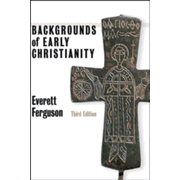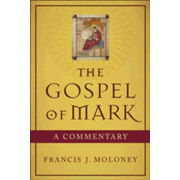IN THE readings set aside for the Nineteenth
Sunday after Pentecost, we continue hearing from a dialog in the Gospel
According to Saint Mark. We find ourselves at the conversation wherein a
disciple questioned the authority of an outsider, one who was doing good works
in our Lord’s name. The answer our Lord offered gives us needed guidance
concerning our Christian relationships to other persons in the faith, and in
the world.
John
said to him, “Teacher, we saw a man casting out demons in your name, and we
forbade him, because he was not following us.”
But Jesus said, “Do not forbid him; for no one
who does a mighty work in my name will be able soon after to speak evil of me.
For he that is not against us is for us. For truly, I say to you, whoever gives
you a cup of water to drink because you bear the name of Christ, will by no
means lose his reward.
“Whoever causes one of these little ones who
believe in me to sin, it would be better for him if a great millstone were hung
round his neck and he were thrown into the sea.
And if your hand causes you to sin, cut it
off; it is better for you to enter life maimed than with two hands to go to
hell, to the unquenchable fire. And if your foot causes you to sin, cut it off;
it is better for you to enter life lame than with two feet to be thrown into
hell. And if your eye causes you to sin, pluck it out; it is better for you to
enter the kingdom of God with one eye than with two eyes to be thrown into
hell, where their worm does not die, and the fire is not quenched.
For every one will be salted with fire. Salt
is good; but if the salt has lost its saltiness, how will you season it? Have
salt in yourselves, and be at peace with one another.” (Mark 9:38-50)
 |
Backgrounds of Early Christianity, Third Edition By Everett Ferguson |
In
His Name…
The disciple John went to Jesus. As
a follower and student, he voiced concern over the ministry of someone who worked
outside the mandate given to the disciples. John told our Lord
that the group stopped the man from doing such, because he was not one of them.
Based on the earlier conversation recorded in this same chapter of Mark, wherein
the disciples were warned about jealously guarding their turf in the
prospective kingdom... we see here that they were still shielding their future political
aspirations.
Some scholars studying this text have indicated
that it became important for Mark’s mid-first century community to cite
this occasion, because the conversation dealt with issues afflicting the early
Church. Some say that these competitive natures were not an issue with the
original disciples. These authorities hold that the text, therefore, is a remembrance of a later acquired attitude. The text was inserted, therefore,
as a reminder only when the ministry of such as Paul was at issue for the
community.
Given this possibility however, I contend that though the
secondary use by Mark may indeed be intentional and likely, there is little
reason to discount the importance and actuality of this conversation during
Jesus’ earthly ministry. The witness given in Mark contains many hints about the reluctance of the disciples to comprehend our Lord's mission. If we assume such use, our focus is rightly
placed upon Jesus’ response. The attitude he cites stands for all of us regardless of the
decades or centuries through which the Church must work. He clearly stated for
them and thus voiced to all, including we ourselves today as Christians, that we should not
hamper others who do great works in his name. Our Lord warned that these outsiders,
as “little ones”, should not be hampered by the Church.
 |
Gospel of Mark, The: A Commentary - eBook By Francis J. Moloney |
We note that in correlation within the
arrangement of the episodes, Mark described that Jesus used the same child-like
term to describe the unknown worker, as had been previously found in Mark 9:36
when he first placed an actual child before them as example of the disciples. Consequently, now using a
fourfold warning, our Lord cautioned his disciples against being so jealous
that they would impede the declaration of God’s grace. If they persisted in
jealously in guarding their perceived positions and agendas, they could find
themselves working against the very reason that Jesus had come out.
Today we can take much from this a sure message. If
any disciple, individual church or denomination should impede the right
declaration of the gospel by another… they may find themselves clearly
described by the words of the prophets…
“And they shall go forth and look on the dead bodies
of the men that have rebelled against me; for their worm shall not die, their
fire shall not be quenched, and they shall be an abhorrence to all flesh.”
(Isaiah 66:24)
To further illustrate the point, we need to
carefully weigh the words and deeds of others. Jesus told them that any person
or community that would act in self-centered manner, would be like salt that
had lost its flavor. Dead salt, like the low quality salt that was often found
in the Dead Sea, was cast away as worthless. Useless salt was thought to represent
foolishness, fiery wickedness and unbelief. This description may fit many apostate denominations today.
Wisdom
rescued a righteous man when the ungodly were perishing; he escaped the fire
that descended on the Five Cities. Evidence of their wickedness
still remains: plants bearing fruit that does not ripen, and a pillar of salt
standing as a monument to an unbelieving soul. For because they passed wisdom
by, they not only were hindered from recognizing the good, but also left for
mankind a reminder of their folly, so that their failures could never go
unnoticed. (Wisdom 10:6-8)
Surely then, to anyone who remembered the
audacity of Lot’s wife, this admonition brought a sun-bleached warning rather
than instilling refreshed images of sustenance. Jesus’ words no doubt reminds us,
therefore, that salt is a rather ambiguous substance. When used properly, salt
is an invigorating, life supporting element. Salt is a precious commodity. As applied
heavily upon the surface of food, it supplies a penetrating, protective
preservation. Salt is also used to put fire in the belly, so that a person
could retain water… to endure and sustain life in the fiery furnaces of the dry,
desert places.
 |
We Will Not Be Silenced: Responding with Courage to Our Culture's Assault on Christianity By Erwin W. Lutzer |
Be
Glad!
In such way, Jesus warned us that the
ministry of all true children of God is guided by the Holy Spirit. Thus we need to
eliminate undue jealousy, so that efforts should not be made in vain because of
striving amongst ourselves. Our energy should be more rightly applied to giving
life sustenance to others. This is the proper salt that was given to the Church by our
Lord…
Beloved,
do not be surprised at the fiery ordeal which comes upon you to prove you, as
though something strange were happening to you. But rejoice in so far as you
share Christ’s sufferings, that you may also rejoice and be glad when his glory
is revealed. If you are reproached for the name of Christ, you are blessed,
because the spirit of glory and of God rests upon you. (1 Peter 4:12-14)
Therefore any church, denomination or person following right and proper instructions and teachings according
to the scriptures stand inherited from the days of walking alongside our Lord. However, we should
not cast dispersion upon any other entity doing good works in our Lord’s name.
Note also that if the generous activity is done for selfish
promotion or steerage toward a false gospel message, it should rightly be condemned. We
must take notice that those who historically spoke falsely to either demean
or distort our Lord’s loving care poured out upon the cross,
had been condemned to fall silent. Though these may seem to have flavored the stew for a time… and
some errors occasionally burp tastelessly into modern society… they are all destined to be mute, salt-encased witnesses standing before the eternal judgment of
our God.
Therefore, as disciples working in the
modern world we need for the most part to center only on the mission that we are given. The Christian
Church by grace is called to proclaim the true faith, given by the
Word who is Jesus Christ. Let us therefore pray to
the Holy Spirit, which is the Spirit of Christ our Lord… so that we may do wonderful deeds for the good of those in this evil world unfolding around us.
Thanks be to God!
Seasons Change; Gospels Don't!


No comments:
Post a Comment